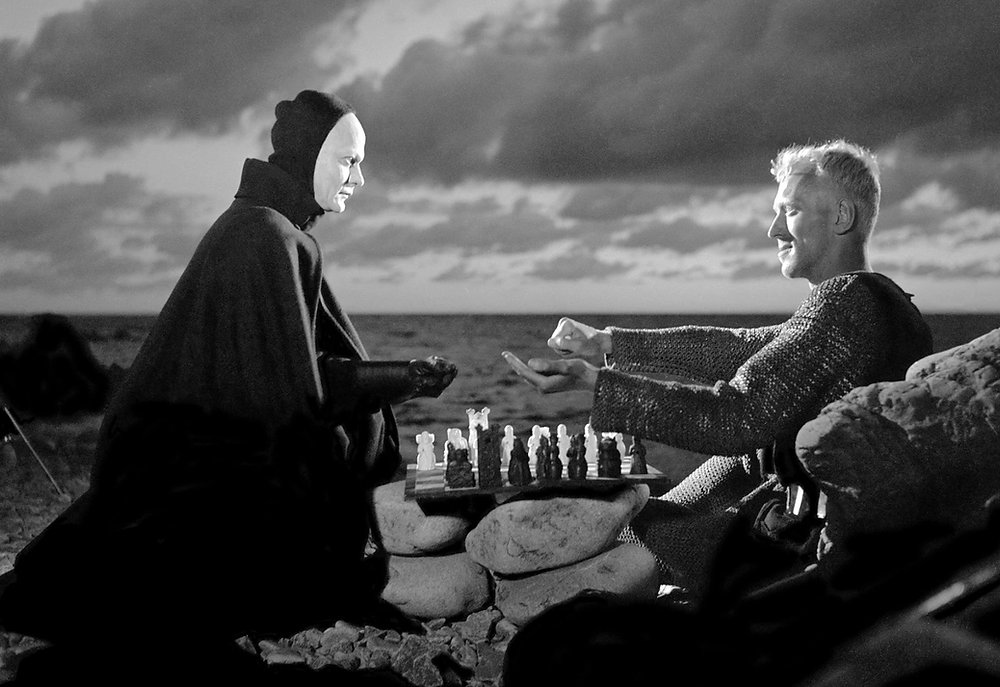
MOVIE: "The Seventh Seal" (1957) - A Profound Journey into Existentialism and Mortality
By Adedayo Oyetoke, Published on: July 10th 2023 5 min, 939 word Views: 1471
"The Seventh Seal," directed by Ingmar Bergman, is a Swedish art film that stands as a timeless masterpiece, captivating audiences with its thought-provoking exploration of profound philosophical themes. Set during the time of the Black Plague in medieval Europe, the film follows a knight who engages in a game of chess against Death, as he contemplates the meaning of life, the existence of God, and the inevitability of mortality. With its stunning visuals, rich symbolism, and compelling performances, "The Seventh Seal" remains a cinematic gem that continues to resonate with audiences to this day.
The film follows the journey of a disillusioned knight named Antonius Block, brilliantly portrayed by Max von Sydow, who returns from the Crusades to a plague-ridden Sweden. As he confronts his own mortality, Block encounters Death personified, played by Bengt Ekerot. In a desperate attempt to buy more time, Block challenges Death to a game of chess, symbolizing the eternal struggle between life and death.
Throughout their game, Block engages in philosophical discussions with Death, exploring profound questions about faith, the existence of God, the meaning of life, and the nature of human suffering. These conversations are not only intellectually stimulating but also emotionally resonant, as they delve into the depths of human existence and the search for meaning in the face of inevitable death.
1. The Setting and Atmosphere:
"The Seventh Seal" takes place in the 14th century, a time of great despair and uncertainty due to the devastating Black Plague. The film's black-and-white cinematography, combined with the hauntingly beautiful landscapes of the Swedish countryside, creates a sombre and atmospheric backdrop that perfectly captures the bleakness of the era.
2. The Chess Game with Death:
The central premise of the film revolves around a game of chess between the knight, Antonius Block, and Death himself. This metaphorical game becomes a vehicle for exploring profound existential questions about life, death, and the search for meaning. The intense and suspenseful chess matches between the knight and Death serve as a captivating narrative device throughout the film.
3. The Quest for Meaning:
As the knight confronts his mortality, he embarks on a quest to find answers to life's fundamental questions. He encounters a variety of characters, each representing different perspectives on faith, morality, and the human condition. Through these encounters, the film delves into themes of faith, doubt, and the search for purpose in a world plagued by suffering.
4. Symbolism and Allegory:
"The Seventh Seal" is rich in symbolism and allegory, inviting viewers to interpret its deeper meanings. The recurring motif of the dance of death, the presence of religious iconography, and the use of light and darkness all contribute to the film's layered symbolism. Bergman masterfully weaves these elements together to create a visually stunning and intellectually stimulating cinematic experience.
The iconic image of Death, clad in a black cloak and wielding a scythe, has become an enduring symbol of mortality in cinema. Bergman's use of stark imagery, such as the Dance of Death sequence, further emphasizes the film's exploration of the fragility and transience of human life.
5. Performances and Character Development:
The performances in "The Seventh Seal" are exceptional, with Max von Sydow delivering a captivating portrayal of the knight, Antonius Block. His stoic yet vulnerable performance perfectly captures the internal struggle and existential crisis faced by the character. The supporting cast, including Bengt Ekerot as Death and Gunnar Björnstrand as Jöns, the knight's squire, also deliver nuanced and memorable performances that add depth to the narrative.
6. Philosophical Themes:
At its core, "The Seventh Seal" is a philosophical exploration of existentialism, faith, and the human condition. It raises profound questions about the existence of God, the nature of belief, and the search for meaning in a world filled with suffering and uncertainty. The film invites viewers to reflect on their own mortality and contemplate the choices they make in the face of inevitable death.
7. Cinematic Influence:
"The Seventh Seal" has had a significant impact on the world of cinema, influencing numerous filmmakers and becoming a touchstone for art films. Its exploration of existential themes and its innovative storytelling techniques have inspired generations of filmmakers to delve into deeper philosophical and psychological realms in their work.
Bergman's masterful direction and cinematography elevate "The Seventh Seal" to a visual and auditory feast. The film's striking compositions, long takes, and use of light and shadow create a haunting and atmospheric ambiance. The iconic scene of Block playing chess with Death on a windswept beach has become an indelible image in cinema history.
The film's score, composed by Erik Nordgren, adds another layer of depth to the storytelling. From the haunting melodies to the powerful choral arrangements, the music enhances the film's emotional impact and heightens the sense of existential dread.
"The Seventh Seal" has had a profound influence on cinema and popular culture. Its exploration of existential themes and its innovative storytelling techniques have inspired generations of filmmakers to delve into deeper philosophical and psychological realms in their work. The film's impact can be seen in the works of directors such as Stanley Kubrick, Martin Scorsese, and Lars von Trier, who have all acknowledged Bergman's influence on their own artistic journeys.
Conclusion:
"The Seventh Seal" is a cinematic masterpiece that continues to captivate audiences with its profound exploration of existential themes. Through its stunning visuals, rich symbolism, and thought-provoking dialogue, the film invites viewers to contemplate the mysteries of life, death, and the human condition. Bergman's masterful direction and the exceptional performances of the cast make "The Seventh Seal" a timeless classic that stands as a testament to the power of cinema to provoke introspection and ignite philosophical discourse.
